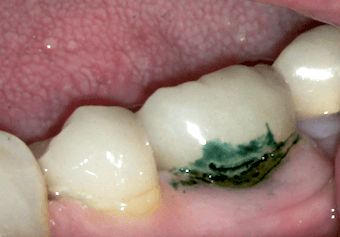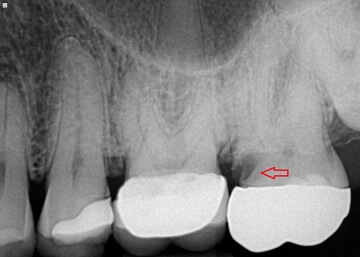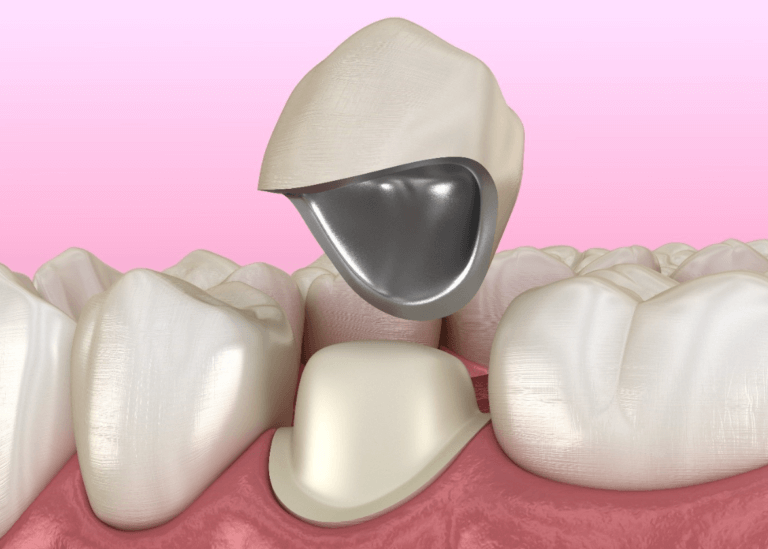A Cavity Under A Crown

What Is A Cavity Under A Crown?
A cavity under a dental crown refers to tooth decay that has developed underneath a dental crown. A dental crown is a cap that is placed over a damaged or decayed tooth to protect it and restore its shape, size, and function. While a dental crown can effectively protect a tooth from further damage and decay, it is not invulnerable. Over time, bacteria can accumulate around the base of the crown, leading to decay underneath the crown. This can cause a range of issues, including tooth sensitivity, tooth pain, and even infection. If left untreated, a cavity under a crown can cause serious damage to the underlying tooth and surrounding structures. Therefore, it’s important to recognize the signs and symptoms of a cavity under a crown and seek prompt treatment from your dentist.
Before you contact a Toronto dentist to examine A Cavity Under A Crown, there are some things you should know as a patient:
- Why Do I Have A Cavity Under A Crown?
- Signs And Symptoms Of A Cavity Under A Crown
- Treatment Options For A Cavity Under A Crown
- How To Prevent A Cavity Under A Crown?
- Managing A Cavity Under A Crown Until You Can See The Dentist
If you have questions about A Cavity Under A Crown or other dental problems, please contact us for more information.
Why Do I Have A Cavity Under A Crown?
There are several reasons why you may develop a cavity under a crown, including:
- Poor oral hygiene: Neglecting to brush and floss regularly can lead to the buildup of harmful bacteria around the base of the crown, which can cause decay.
- Age: Over time, the cement that holds the crown in place can degrade, leaving gaps that allow bacteria to penetrate and cause decay.
- Wear and tear: The crown itself can become damaged or cracked over time, creating spaces for bacteria to grow.
- Improper fit: If the crown doesn’t fit properly, meaning there are ledges or gaps between where the crown meets the tooth, it can create an opportunity for bacteria and plaque to accumulate and cause decay.
- Diet: Consuming a diet high in sugar and other carbohydrates can contribute to the development of decay around the crown.
It’s essential to take care of your dental crown just as you would your natural teeth to avoid developing a cavity underneath it. If you have further questions about A Cavity Under A Crown, please contact us.
Signs And Symptoms Of A Cavity Under A Crown
If you have a cavity under a crown, you may experience one or more of the following signs and symptoms:
- Tooth Sensitivity: You may feel pain or sensitivity when you eat or drink hot, cold, or sweet foods and beverages.
- Tooth Pain: You may experience a persistent or intermittent toothache, particularly when biting or chewing.
- Discomfort: You may feel discomfort or pressure around the affected tooth.
- Gum Swelling: You may notice swelling or redness around the gum line near the affected tooth.
- Bad Breath: You may experience persistent bad breath or a bad taste in your mouth.
If you experience any of these symptoms, it’s essential to seek prompt treatment from your dentist. A cavity under a crown can worsen over time, leading to more severe issues such as infection and even tooth loss. Your dentist can evaluate your tooth and recommend the best course of treatment to address the cavity and prevent further damage. If you have further questions about A Cavity Under A Crown, please contact us.

Treatment Options For A Cavity Under A Crown
If you have a cavity under a crown, your dentist may recommend one or more of the following treatment options:
- Crown replacement: In some cases, the decay may be extensive enough that the existing crown needs to be removed and replaced with a new crown to properly seal the tooth and prevent further decay.
- Root canal therapy: If the decay has spread to the pulp of the tooth, your dentist may recommend a root canal procedure to remove the infected tissue and restore the tooth’s health.
- Filling or bonding: If the decay is minimal and hasn’t spread beyond the area around the base of the crown, your dentist may be able to remove the decay and fill the area with a dental filling or bond the area to seal it and prevent further decay.
The best treatment option for a cavity under a crown depends on the extent of the decay and the overall health of the tooth. Your dentist can evaluate your tooth and recommend the best course of action to restore the tooth’s health and prevent further damage. If you have further questions about treatment options for A Cavity Under A Crown, please contact us.
How To Prevent A Cavity Under A Crown?
Here are some tips to help you prevent a cavity under a crown:
- Practice good oral hygiene: Brush your teeth at least twice a day and floss daily to remove plaque and bacteria that can lead to decay around the crown.
- Schedule regular dental checkups and teeth cleanings: Your dentist can monitor the health of your crown and identify any potential issues before they become more serious.
- Maintain a healthy diet: Limit your consumption of sugary and acidic foods and drinks, which can contribute to the development of decay around the crown.
- Consider a dental night guard: If you grind or clench your teeth, consider wearing a mouthguard at night to protect your teeth and your crown.
By taking these steps, you can help to prevent a cavity under a crown and maintain good oral health. If you have further questions about how to prevent A Cavity Under A Crown, please contact us.

Managing A Cavity Under A Crown Until You Can See The Dentist
If you suspect you have a cavity under a crown, it’s essential to seek prompt treatment from your dentist. However, if you can’t get in to see your dentist immediately, here are some steps you can take to manage the issue until your appointment:
- Practice good oral hygiene: Keeping the area around the dental crown as clean as possible can help prevent further decay and alleviate some of the pain or sensitivity. Brush and floss gently around the tooth. Rinsing your mouth with warm salt water or mouthwash can help reduce infection, inflammation and alleviate toothache pain. You can buy any mouthwash available at your pharmacy or health foods store. Alternatively, you can mix a teaspoon of salt in a cup of warm water and swish the solution around your mouth for about 30 seconds before spitting it out.
- Avoid certain foods: Limit your intake of sugary or acidic foods and drinks that could further damage the affected tooth.
- Use Over-the-Counter Pain Medication: Over-the-counter pain medication, such as Advil (ibuprofen) or Tylenol (acetaminophen), can help relieve tooth pain or sensitivity from tooth decay under a crown. Follow the instructions on the label and do not exceed the recommended dose. Unless you have a health condition that prevents you from taking either ibuprofen or acetaminophen, the absolute maximum dose that I recommend patients take for the worst dental pain is 600 mg ibuprofen combined with 1000 mg acetaminophen every 4 to 6 hours.
While these steps can help to manage the issue until your dental appointment, it’s important to remember that they are not a substitute for professional treatment. If you have further questions about treatment options for A Cavity Under A Crown, please contact us.

